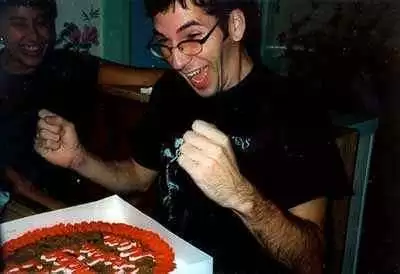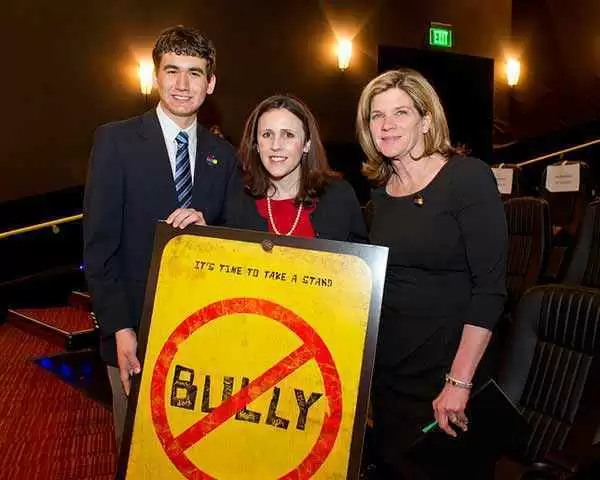
Celiac.com 02/13/2020 - I made a rare visit to a cousin a year or so after I was diagnosed with celiac disease. As the youngest child in a large extended family, my cousin was closer to my mother's age than mine. He took my mother and me on a beautiful ride around Kansas City. I sat in the back seat as they reminisced about their younger lives while passing the places where they experienced them. It came time for lunch and he wanted to take us to a favorite BBQ place in the heart of Independence, MO. I hesitated at his suggestion, and he said, "You aren't one of those vegemanaterians, are you?" The coy word he used, and his tone suggested his disapproval of anything out of the ordinary. (In fact, at that time I was a gluten-free vegan!) I said, "I'll find something." During lunch, I picked at French fries, pretty sure they were cooked in a dedicated fryer. My mother and cousin exuberantly scarfed the BBQ. My cousin told us about another cousin I hadn't seen in over 40 years that I apparently look like and reminded him of. He said, "Cousin Sandra is weird. She used to bring her own food to our family dinners."
He was referring to a time, fifty years ago. Back then, members of the extended family met at my grandmother's house every Sunday to share their views on politics and happenings in the world. It was a close-knit family. Dinner consisted of the main dish (usually pressure cooked ham, green beans, onions, potatoes, bread, and cake for dessert) made by my grandmother, and side dishes brought by my aunts. I was no older than five, and have hazy recollections of these dinners, other than the warmth of family and the familiar smells of home cooking. To be included meant to eat, drink, smoke (it seemed they all did it back then) and converse around that big dining room table. I can imagine that someone daring to bring their own food, spreading it out on their placemat and eating it, while all those other dishes were being passed, might not go over well.
Celiac.com Sponsor (A12):
As I reflect on my cousin Sandra, it occurs to me that she may have had celiac disease. That was in the early 1960's when it was virtually unheard of in the United States. Why else would she have had to bring her own food to those cherished dinners? A diagnosis prohibiting food of any kind would have been alien and unfathomable to anyone in my family. These are people who lived through the depression after all, where popcorn was the fare for breakfast, lunch, and dinner, if they even had that! Waving away any food, especially foods made by loving hands would have been viewed as an arrogant rejection of their abundance and love.
Perhaps she had a mental illness that made her "weird," or maybe she made unreasonable demands on the family, but I think the most likely reason is that she was just trying to protect her health. Considering how my cousin put it, she was weird only because she brought her own food to the family dinners. In his eyes, she became the "weird one," ousted by the family because of her audacity to bring her own food to the dinner party. Family lore according to my mother goes on to say that: "She ultimately divorced our family." Can you do that?
It's a sad story, isn't it? But I think about it from time to time. I wondered if Sandra was so maligned because the family decided her special needs were so odd that they ostracized her, and she ultimately rejected them. Does that mean that anyone in the younger generation who may have inherited the same disease runs the risk of being shunned? I'd like to think we're more enlightened now, but thankfully, I'll never know. I do recall that my mother shushed family when they talked about their illnesses around me, fearing I'd imitate them, I suppose. Her attitude was that you made yourself well, or you made yourself sick, and I think she was careful to protect me from hearing about other people's illnesses so I didn't get the idea that I may have them too. She had a Pollyannaish perspective, and thought everyone in her family was perfect, no matter what. That made it very challenging for me to convince her that something wasn't perfect with me when I was finally diagnosed with celiac disease. In fact, I think she thought I brought it on myself. (I was in my mid-forties when properly diagnosed.) These were her "truths" and likely the "truths" of the collective family.
Most of those people around that dinner table fifty years ago have passed on, I imagine happily gathered "around that table in the sky." In Sandra's case, family members didn't understand her dietary restrictions, agreeing she was "weird" and rejecting her for her special needs. She was stereotyped as a prima-donna. Cumulative family lore develops through repeated acts of storytelling formulating familial ideologies that perpetuate collective "truths." These stories form the group's opinion on given topics. Sometimes these "truths" evolve from just participating in the same activities together, and developing a way of doing things that everyone agrees on, as described with the Sunday dinners above. In their lively discussions, my extended family debated "truths" about politics, news stories, and current events. Similarly, they had a collective opinion about how each other should act while sitting around that table. When someone altered the established norms, like Cousin Sandra, she disturbed rituals, and rocked the family's agreed-upon "truths." Her rejection of the foods required the family to rewrite their collective story. This is rarely done on a conscious level, but rather it is done as groupthink. The unspoken "truth" was: you do what we do, eat what we eat, and even smoke what we smoke in order to fit in. Buck that system, and suffer the consequences.
In Cousin Sandra's case, the group determined her choices were a rejection of the others. She refuted the established but unspoken ideology (or taken for granted truths). As a result, she was rejected and mocked. From their view, if she didn't participate, she self-selected alienation. Before rejecting her, they likely cajoled her to participate, suggesting a little won't hurt you, or come on, just a bite. In fact, I can "see" my grandmother holding up a fork with a bite on it, saying, wouldn't you like just a taste? These urgings are attempts to include rather than exclude. What they really are saying is: you don't want to be rejected by the family by refusing our norms… come on, just have a little so you can stay a part of our group. That is actually a compassionate message. But we don't "hear" it that way when the food being offered to us is poison, and when we feel our needs are not being honored or understood.
"Man is by nature a political animal with an innate tendency to form into groups" (Aristotle). Cousin Sandra was a victim of groupthink. Groupthink is a process described originally by Janis (1972) where those empowered in a group share a common belief, whether it is true or not, and then put pressure on those who do not comply with those truths. Those not going along with the group's ways of thinking are censored, ignored, or ultimately culled unless they comply. Those who share the group's opinion are unified members of the group. Groupthink evolves through the process of familial storytelling where "truths" are formed and solidified, sometimes becoming self-censored, and self-serving (Janis, 1972). Ideologies are assimilated through conversation that conveys a story that intertwines cultural influences with long-held beliefs (Fisher, 1989). Narrators balance truth with motivations in a cohesive story with significant meaning (White, 1980) and seek reinforcement or agreement from outside culture, religion, and political influential forces (McAdams, Reynolds, Lewis, Patten, & Bowman, 2011). This story telling process to formulate "truths" is integral to family traditions, making meaning of shared life, "doing family" (Langellier, & Peterson, 2018, p. 1), and teaching family values (Koenig Kellas & Kranstuber Horstman, 2015). It is in our initial home where we learn fundamentals for what and how to eat, how to cook, how to participate in food-related rituals), as well as gender roles and power structure biases around food (de Certeau, et al., 1998; Pecchoni, Overton, & Thompson, 2008). Groupthink is a way of encouraging belonging to the group or family and creates power structures of "us" and "them." I don't think anyone in my family ever intended to bully Cousin Sandra out of the group, It just happened because of their rigid policies on how we ought to act perpetuating the ideology: Think like us, and belong. I doubt anyone ever talked openly about it because they lacked the tools and skill to broach a constructive conversation.
Food is so integral to our social existence that forsaking the foods made by loving hands implies a repudiation of those hands, and the people who share it. Breaking bread around the dinner table is a way that people bond. Not taking that bread, or accepting that cup of tea, or eating what everyone else eats, is viewed as a silent form of rejection. This is why having gluten sensitivities causes so many social issues, and is one of the topics in my book. People I surveyed and interviewed told me many stories like the one above. As I reflected on what people said, I realized that the root of the problem is that we do not have language to talk about these things. If we could say, "I'm not rejecting any of you by not sharing your food. I have a disease that prevents me from eating it, and I still want to sit at this table and be a part of the conversation." We just don't seem to be able to have these candid conversations. But by identifying these flawed social norms, we can work to change them, so people rejecting food served around the extended family dinner table can be included, loved, and un-judged for their choices. The first step is to identify these long held "truths," put words to them, and discuss them openly, rather than living with unstated dysfunctional consensual rules that cause people who defy them to be alienated.
Let's discuss.
- What long held "truths" does your family live by?
- Please describe a time when you felt excluded because you didn't eat the foods everyone else was eating around the table. How did you handle it? How did the others at the table handle it?
- What would you tell Cousin Sandra if you could talk to her?
- How does your family form "truths?" What happens when someone rocks the "truth" boat in your family? How do you collective reform your opinions/"truths?"
References:
- de Certeau, M., Giard, L., & Mayol, P. (1998). The practice of everyday life, Vol. 2. Minneapolis, MN: University of Minnesota Press.
- Fisher, W. R. (1989). Human communication as narration: toward a philosophy of reason, value, and action. Columbia, SC: University of South Carolina Press.
- Janis, I. L. (1972). Victims of groupthink. Boston: Houghton Mifflin.
- Koenig Kellas, J., & Kranstuber Horstman, H. (2015). Communicated narrative sense making: understanding family narratives, storytelling, and the construction of meaning through a communicative lens. In L. M. Turner & R. West (Eds.), Sage Handbook of Family Communication (pp. 76–90). Thousand Oaks, CA: Sage Publications, Inc.
- Langellier, K. M., & Peterson, E. E. (2018). Narrative performance theory: making stories, doing family. In D. O. Braithwaite, E. A. Suter, and K. Floyd (Eds.), Engaging Theories in Family Communication Multiple Perspectives (pp. 43-56). New York, NY: Routledge.
- McAdams, D., Reynolds, J., Lewis, M., Patten, A., & Bowman, P. (2001). When bad things turn good and good things turn bad: Sequences of redemption and contamination in life narrative and their relation to psychosocial adaptation in midlife adults and in students. PSPB, 27(3), 474-485. doi: 10.1177.0146167201274008
- Pecchoni, L., Overton, B., & Thompson, T. (2008). Families communicating about health. In L. M. Turner & R. West (Eds.), Sage Handbook of Family Communication (pp. 306-319). Thousand Oaks, CA: Sage Publications, Inc.
- White, H. (1980). The value of narrativity in the representation of reality. Critical Inquiry 7(1), 5-27. No doi.











Recommended Comments
Create an account or sign in to comment
You need to be a member in order to leave a comment
Create an account
Sign up for a new account in our community. It's easy!
Register a new accountSign in
Already have an account? Sign in here.
Sign In Now